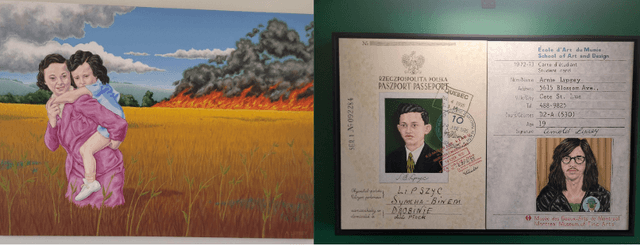What do you do when music you love is tainted by the hateful rhetoric of the artist? In the cabaret From Pain to Power: A Kanye West Musical Protest, musicians CJ Capital and Seth Zosky opened with this question. Both grew up as Kanye fans, but after his recent streams of racist, sexist, and antisemitic tweets, the duo were prompted to rethink their relationship with the rapper. Told in a unique and unconventional way, the performance features vignettes illustrating personal stories of loss and love told through exaggerated physicality and song.
The performance opens with Zosky and Capital explaining how Kanye West’s music played a crucial role in the development of hip hop. They say that as they grew up and formed their taste in music, as well as their own musical talent, Kanye’s numerous innovations in the music industry captured their musical attention. Throughout the vignettes they sing excerpts of Kanye’s songs – both alone and together – highlighting his influence on their development as artists.
Zosky and Capital move with remarkable cohesion, synching their dance moves and expressions to animate every aspect of the story. Their choreography changes at key moments in the performance highlighting the important parts of their speech, the comedical lines of the show, and beats of the music with rhythmic movements. As the former winners of Canada’s Got Talent, their range of pitch and powerful voices shine in each song. Zosky even introduces some of his original music.
Zosky and Capital’s own distinctive stories are communicated throughout the duration of the performance. CJ explains the moments of isolation he felt during the rise of the Black Lives Matter movement in 2020 and the racism he faces day-to-day, while simultaneously sharing his proud Haitian culture through his music and story-telling. Zosky discusses being in Israel on October 7th and the recent rise of antisemitism. Both express the pain and abandonment they felt when Kanye, their former hero, made continuous anti-Black and antisemitic statements.
One of the issues with Kanye’s prodigal status is that followers look to Kanye as a God, Zosky and Capital say. Zosky even quotes the Torah, saying that Jews may not idolize anyone but Hashem. Bringing home their criticism of worship fueled by idolization—like the nature of Kanye fandom— they close the performance through two prayers, each reciting one from their respective religions. By praying for a better world, the duo hope to inspire the audience to take meaningful action, both within themselves and in their communities.
Ultimately, their message is one of love: that we should ignore influential propagators of hate and focus on those in our lives who bring us joy. Interestingly, they both tell stories of losing those they have loved: Zosky talks about his cousin, and Capital talks about his childhood best friend. They hope that by telling us these stories of their relationships, they are shining a light on the power of love, over the story of hatred. Within the theme of Kanye, though, this felt like a loose strand. Sad, sure, and a nice touch, but not at all relevant from the overarching problem of separating their love for Kanye’s music from his changed personality.
This is an example of a broader struggle to tell a coherent story. Instead, the performance seemed to be a random intertwinement of different parts of their lives connected through acting and song. They touched on the issue of celebrities being idolized, with Kanye as a prime example. Then, they moved to recreating their journey as the champions of Canada’s Got Talent during COVID-19. They acted out scenes from their university experiences, redoing ballet performances to the backtrack of Kanye music. Perhaps this was the intent–to communicate the complex feelings the artists were grappling with through multifaceted, almost chaotic artistic expression.
Though the artists opened the performance labelling it a “story of betrayal,” they didn’t put forth a clear response to Kanye’s hate. Was their answer to pray? Or to ignore the hate and just think about those you love? Should I still listen to Kanye’s music? Do they still listen to his music? Even though the show failed to provide a definitive response to Kanye’s hate, or answer the age old question of whether one can separate the art from the artist, I was certainly entertained.
The mix of Black and Jewish pain, represented through such eccentric art forms, is nothing if not unique. For the audiences attending the show in Montreal this week, simply watching is not enough. Leaving the auditorium, viewers had explored more about how their community contributes to hate and were inspired to take action to stop hatred in ways beyond just praying for a better world.
Powered by Froala Editor






